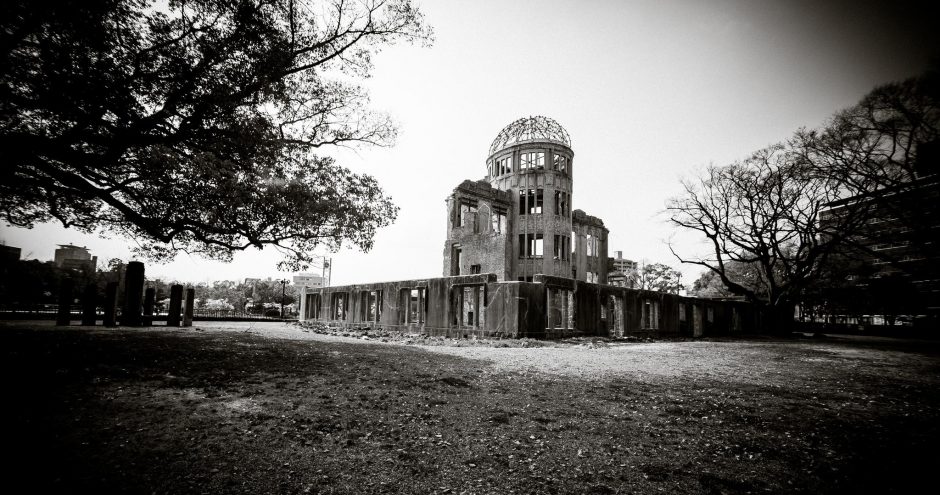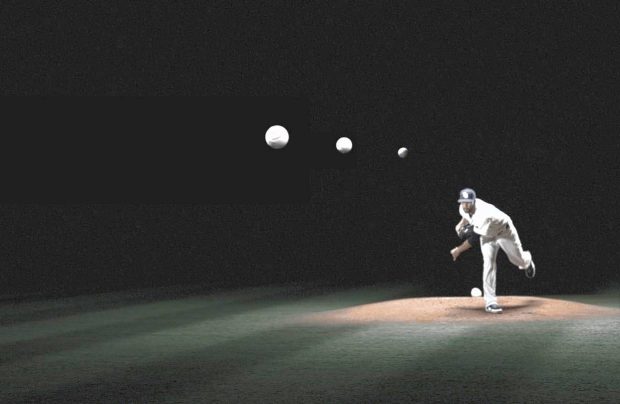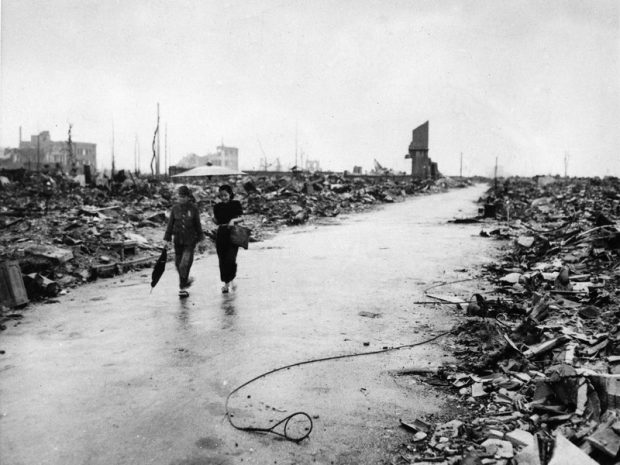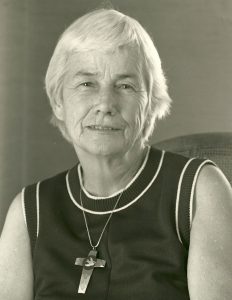If you wish, you can hear the sermon as it was preached from the UCJ pulpit. Simply click the play button below:
Delivered at the United Church of Jaffrey
August 6th, 2017
Genesis 32:22-31 | A Quote from an Interview with Barbara Reynolds.
I’ll never forget one evening when I was walking to the Friendship Center, and I saw a woman coming toward me leading somebody. This person had a huge, swollen head. It looked like a cauliflower… the face was not recognizable. It was just the most horrible looking face. When they saw me coming they went over and stood in the shadows, the person turned its head toward the wall until I went by. When I got to the Center, I told a woman there about it and she said “A lot of them don’t go out until after dark. Then they are taken for a walk and go back to their rooms.”
– Barbara Reynolds
Imagine this.
We’re watching a baseball game.
Not any baseball game.
It is the 7th game of the World Series…
The series tied three games each.
It’s the bottom of the 9th inning.
The game is tied.
There is a man on third base.
The count is full – three balls, two strikes.
The pitcher winds up.
The ball leaves the pitcher’s hand.
OK… stop!
Let’s stop time.
The ball is motionless, hanging in the air.
This instant… this milli-second is baseball at its purest.
The rules… the diamond… the umpires… the good year blimp… the on-deck circle… the live broadcast… the fans…
Everything from the multi-million dollar player contracts, to the two dollar bags of peanuts sold in the bleachers – the entire game of baseball — is designed to create this exact instant.
The batter starts to swing…
Will the bat connect?
Or will it swing and miss?
The hopes and dreams of the entire season hang on the outcome of this one swing, that is taking place in one breathless instant in time…
It is the moment of pure drama.
*
In human life, also, we sometimes find ourselves in moments of pure drama.
These are moments when the circumstances and conditions line-up in precisely the right way to change you forever.
We know about this.
We know about this because we humans are good at recognizing the conditions, and understanding the consequences.
We are good at this because we are designed to understand story.
A story does this.
A story develops the conditions,
— sets up the moment of pure drama,
and describes the resulting change.
Conditions. Moment of pure drama. Change.
These three elements combine to make story.
And story uses these elements to teach us essential lessons about what it means to be human.
*
The Bible, of course, is an overflowing treasure chest of these stories.
Today’s reading from the 32 chapter of Genesis is an excellent example.
The greater conditions and circumstances that set up this story build over many chapters of the Book of Genesis, as Jacob, the wily son of Isaac, weaves his elaborate tales of trickery.
If we stay within this passage though, we see the following conditions:
Jacob is travelling with his family — a large entourage.
He sends his family across the river Jabbok.
Jacob finds himself alone.
And it gets dark.
Think about this. Your loved ones are gone. You are alone. It gets dark.
What’s the worst thing that could happen?
When I imagine myself in this scenario, it seems to me the most terrifying thing that could happen, would be if a mysterious stranger appeared.
That would be bad.
And what if that mysterious stranger attacked me?
That would be really bad.
Alone.
After dark.
A mysterious stranger.
These are the perfect conditions to inspire fear in the human soul.
How would you respond?
Bible stories ask us these questions.
Bible stories create circumstances that we cannot escape from – conditions that force us into moments of pure drama – moments that change us.
*
Because of its strategic position near the outlet of Japan’s inland sea, Hiroshima’s history was intricately connected with militarism. As early as 1894 Hiroshima, was the departure point for troops heading off to the first Sino-Japanese War. From this time on, Hiroshima became an increasingly important stage of operations, providing troops, provisions, and ammunition to serve Japan’s imperialist ambitions.
Hiroshima entered the twentieth century riding an economic boom created by militaristic zeal. The imperialist fervor that began with the first Sino-Japanese War held the city in its unabated sway, well into the era of the Second World War.
And then, at 8:15 am on August 6th 1945, an atomic bomb detonated 1 thousand 9 hundred feet above the city of Hiroshima.
The Atomic Heritage Foundation – an organization dedicated to documenting the history of the development and use of the atomic bomb, says that…, quote…
At the time of the bombing, Hiroshima was home to 280,000-290,000 civilians as well as 43,000 soldiers. Between 90,000 and 166,000 people are believed to have died from the bomb in the four-month period following the explosion. The U.S. Department of Energy has estimated that after five years there were perhaps 200,000 or more fatalities as a result of the bombing, while the city of Hiroshima has estimated that 237,000 people were killed directly or indirectly by the bomb’s effects, including burns, radiation sickness, and cancer.
The atomic bombing –the most destructive instant in human history—transformed Hiroshima from a city defined by war into a city whose name is synonymous with the hope of peace.
Today, the word “peace” is everywhere in Hiroshima.
Every monument looks backwards at the bomb, and forward toward a hope for peace.
Each year, on the anniversary of the bombing, the peace park holds massive international and ecumenical rituals that call for an end to war.
*
Six years later, in 1951, a Doctor named Earle Reynolds arrived in Hiroshima.
Doctor Reynolds had been sent by the Atomic Bomb Casualty Commission that had been ordered, by President Truman, to study the effects of the atomic bombs.
The Atomic Bomb Casualty Commission did not provide medical care. The purpose of the commission was to study, not to heal.
However, Doctor Reynolds’ wife, Barbara, and his three children also moved to Hiroshima.
Unlike her husband, Barbara Reynolds could not look at the Japanese as objects of study.
Because of her husband’s work, Barbara came into close contact with many Hibakusha – atomic bomb survivors.
This morning’s modern reading is an excerpt from an interview with Barbara Reynolds.
I’ll never forget one evening when I was walking to the Friendship Center, and I saw a woman coming toward me leading somebody. This person had a huge, swollen head. It looked like a cauliflower… the face was not recognizable. It was just the most horrible looking face. When they saw me coming they went over and stood in the shadows, the person turned its head toward the wall until I went by. When I got to the Center, I told a woman there about it and she said “A lot of them don’t go out until after dark. Then they are taken for a walk and go back to their rooms.”
This passage reminds me of Jacob wrestling with the mysterious stranger.
Like Jacob, Barbara Reynolds was confronted, that evening, with a kind of spirit – a dark specter that, in a chilling moment, forced her to see all the horrifying human cost of the war.
It was moments like this that changed her.
She came to Japan as the passive wife of a scientist, and she became a powerful peace activist, who worked tirelessly on behalf of the atomic bomb survivors for many decades.
In 1962, according to her Wikipedia page, Barbara…
organized the Peace Pilgrimage, accompanying the two hibakusha (Atomic bomb survivors) around the world as they shared their personal experiences of atomic war, appealing to world leaders to ban nuclear weapons. Over five months, the three Peace Pilgrims traveled through 13 countries, including the Soviet Union, appealing for nuclear disarmament and receiving a warm and open reception from public leaders, churches, schools and the media. During their six weeks in the United States, they spoke to 187 groups and met with many leaders in Washington D.C. and at the United Nations.
We all face moments like this.
Moments, after dark, when we are vulnerable to the undeniable reality of suffering – our own suffering, and the suffering of others.
Scripture tells us, in story, to expect this. To expect moments in life when one is alone, and in this condition of aloneness, one must face ones demon.
The mysterious stranger who wrestles with you in the dark.
Maybe it will be in the form of a person.
A dark force.
A memory.
A deep pain.
How will you respond?
What does our God require of you?
How do we, like Barbara Reynolds, and Jacob before her, confront the darkness and find grace?
These are deeply personal questions.
At some point in our lives each of us must face these moments.
At first it feels as though we are alone
but perhaps we are not.
this, perhaps, is our faith.
Amen




